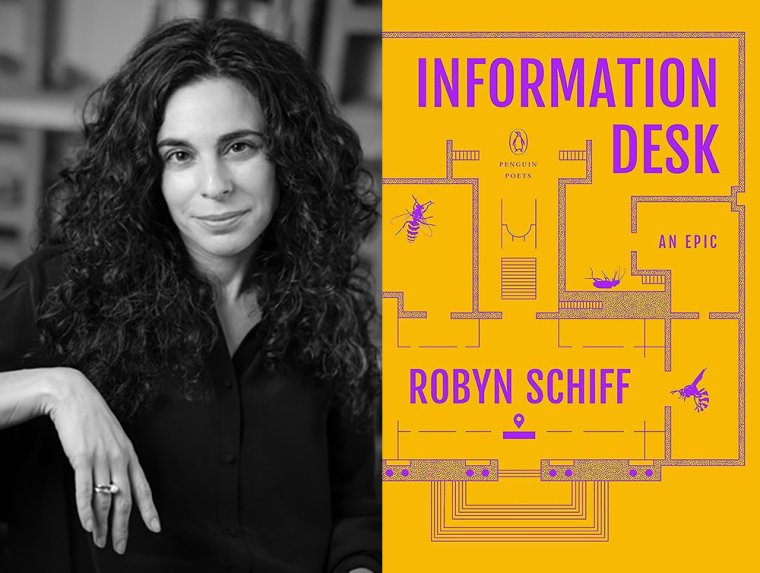This week’s installment of Ten Questions features Robyn Schiff, whose new book, Information Desk: An Epic, is out today from Penguin Poets. In this book-length lyric, Schiff chronicles her experiences working in the Metropolitan Museum of Art in New York City during the 1990s. A study of memory as much as of art, the verse meanders through the Met’s prodigious collections and exhibitions, narrates encounters with the public at the eponymous desk, navigates relationships with museum staff members, and explores the more current reality from which the speaker gazes back in wonder at her time inside this vast repository of human craft and creativity. Schiff orchestrates an engaging drama of consciousness that lures the reader down each page, capturing the mind’s quicksilver leaps from past to present and back again as it pings in Proustian fashion from sensory trigger to anecdote to meditation on history, science, and a panorama of other subjects treated with a mix of vulnerability and wit. Robyn Schiff is the author of three previous poetry collections: Worth (University of Iowa Press, 2002), Revolver (University of Iowa Press, 2008), and A Woman of Property (Penguin Poets, 2016), which was a finalist for the Los Angeles Times Book Prize. The recipient of the 2023 Joseph Brodsky Rome Prize, she is a professor at the University of Chicago and a coediter of Canarium Books.

Robyn Schiff, author of Information Desk: An Epic. (Credit: Nicole Craine)
1. How long did it take you to write Information Desk?
It took me about twenty years not to write it, and then another six to sit down and do it.
2. What was the most challenging thing about writing the book?
Limiting and defining the scope. Information Desk takes place at the Metropolitan Museum of Art, which holds over a million objects created over a span of about five thousand years. The poem derives its energy wandering the corridors there and encountering works of art. Deciding which objects to attend to was an exciting challenge.
3. Where, when, and how often do you write?
When I’m really writing, deep in a poem, I do so seated at my desk—as often as I can for as many hours in a row as possible, at multiple intervals around the clock. But I’m much more often not writing. I’ve never been interested in writing every day, and sometimes years have passed between poems. I value these pauses as much as I value intense periods of creativity, and in a long life in poetry, these phases have come to balance out.
4. What are you reading right now?
I was reading Henry James’s novel Roderick Hudson but had to return it to the library in a different country before I finished it, so I picked up Elizabeth Bowen’s The Heat of the Day. As soon as I finish that I’ll return to Roderick, a new copy of which has just arrived. For poetry, I’m reading Lynn Xu’s And Those Ashen Heaps That Cantilevered Vase of Moonlight. For nonfiction, I’m reading Black Bodies, White Gold by Anna Arabindan-Kesson.
5. What was your strategy for organizing the poems in this collection?
Information Desk: An Epic is a book-length poem in three parts divided by three invocations to wasps.
6. How did you know when the book was finished?
I’m not sure it is finished. In the course of the poem, on page 113, I ask myself how to exit the museum where the poem takes place. Ultimately I finished the poem shortly after that point because I close the museum after a workday there and lock the door; but I wonder if there might be a volume two? Ask me again in a few years.
7. What is one thing that surprised you during the writing of Information Desk?
There isn’t one single surprise that stands out but a confluence of unexpected factors: I didn’t imagine that I would relocate homes as often as I did during the composition (I worked in six different houses), anticipate a pandemic, or expect a profound social and political reckoning and its backlash. It was a surprise to find these present-tense situations shaping the poem.
8. If you could go back in time and talk to the earlier you, before you started Information Desk, what would you say?
There’s a pandemic coming: Go visit your parents, and then make time for a big trip to the Met—it’s going to abruptly close.
9. What forms of work, other than writing, did you have to do to complete this book?
I had to look closely, remember, grieve, research, and redirect.
10. What’s the best piece of writing advice you’ve ever received?
Read more than you write.








